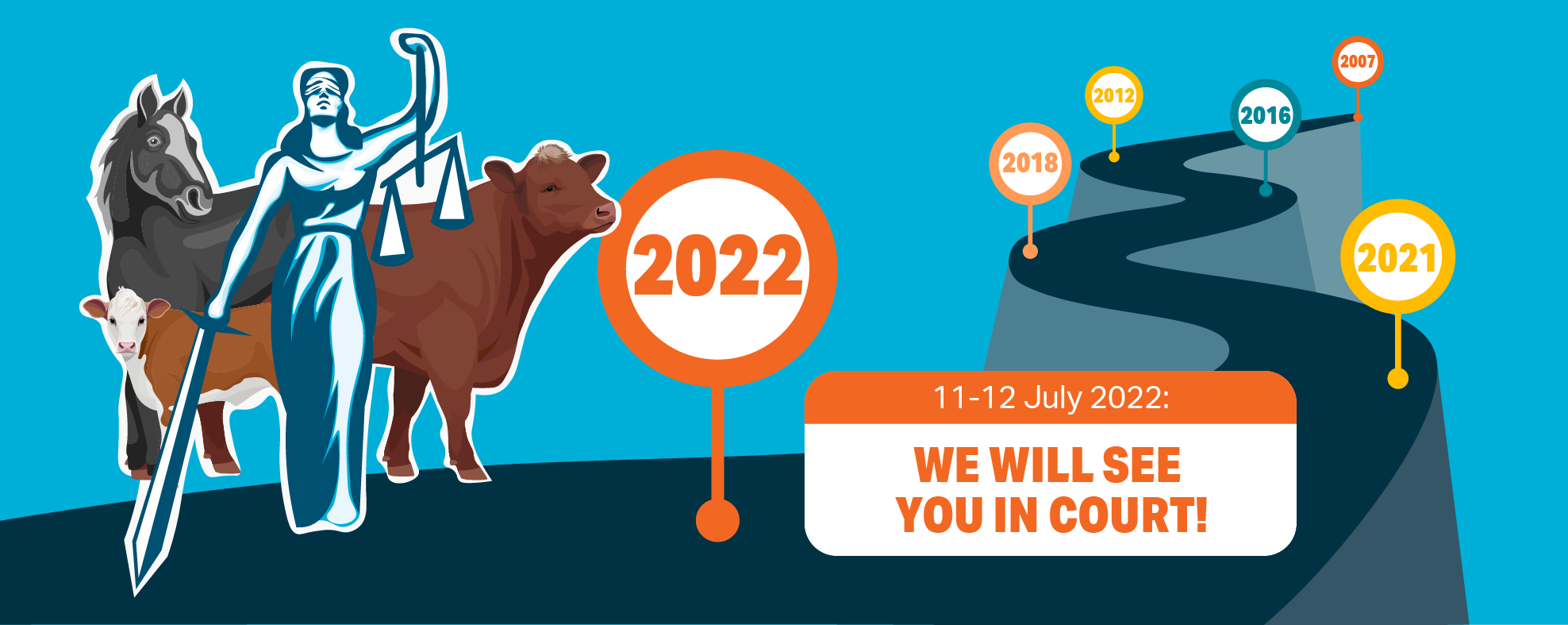
NZALA & SAFE to challenge the legality of Rodeo in NZ
June 2nd, 2022In 2019, The New Zealand Animals Law Association (NZALA) and SAFE partnered for the first time to seek legal justice for animals in Aotearoa, and we won, with the High Court delivering a damning judgement, ruling that farrowing crates and mating stalls for pigs were unlawful.
Now, we are partnering again to challenge the legality of Rodeo and we’ll be at the High Court on the 11th and 12th of July this year.
Why rodeo?
Around 35 rodeos take place in New Zealand each year. These events include activities such as calf roping, bareback bronc riding, steer wrestling, barrel racing, team roping, saddle bronc riding and bull riding. Most rodeo activities involve conduct that causes animals pain and/or distress. Animals used in rodeo can suffer from both physical injuries and psychological stress. Physical injuries can include broken bones from roping or bucking during riding, or bruising and ruptured skin from the use of spurs and ropes.
Who is involved?
Applicants
(parties bringing the case)
- NZALA (New Zealand Animal Law Association)
- SAFE (Save Animals From Exploitation)
NZALA is a coalition of lawyers who work voluntarily to improve the welfare and lives of animals through legal means. NZALA undertakes a range of legal work to encourage the development of animal law within the New Zealand legal profession.
SAFE is New Zealand’s largest animal rights organisation and has been campaigning to end rodeo for many years. (Check out this timeline of how we got here).
Respondents
- The Attorney General (for and on behalf of the Minister for Agriculture)
- NAWAC (National Animal Welfare Advisory Committee)
The first respondent, the Attorney-General, is the principal plaintiff or defendant on behalf of the Government in the courts and the Minister of Agriculture is responsible for the administration of the Animal Welfare Act. This includes the issue, revocation, amendment and review of codes of welfare and the making of recommendations that regulations be made relating to animal welfare standards or requirements. The Minister was responsible for issuing the 2018 Code of welfare: Rodeos, which permits the activities in rodeo which cause animals pain and distress.
The second respondent is NAWAC, an independent committee which provides advice to the Minister of Agriculture. NAWAC’s functions include making recommendations to the Minister concerning codes of welfare and regulations related to animal welfare standards or requirements. NAWAC’s recommendations have informed the current code of welfare and the specific regulations mentioned above.
In November 2021, a third respondent asked the Court to be a part of this case– The New Zealand Rodeo Cowboy Association Inc, the people who are responsible for running the programme of rodeo events across Aotearoa.
Grounds for the case – is rodeo lawful in NZ?
This is a judicial review, which means a judge will be asked to review the actions of the Government. With this process, we seek to show rodeo practices breach the Animal Welfare Act 1999 and that the current regulations and the code of welfare which allow those practices are unlawful and invalid.
The grounds for this case are both procedural and substantive
Relationship between The Animal Welfare Act and Codes of Welfare
The Animal Welfare Act 1999 is primary legislation that was created by Parliament. Section 70 (1) of the Act confer powers to NAWAC, an independent advisory committee, to review and recommend Codes of Welfare to the Minister of Primary Industries.
The Animal Welfare Act provides broad and basic protections for animals, where Codes of Welfare are essentially there to ‘fill in the gaps’, providing specific guidelines and minimum standards for the care of animals.
These minimum standards must meet the overarching principles of the Animal Welfare Act.
Therefore, Codes of Welfare are a form of delegated legislation, as they have not been created by Parliament and are thus required to meet the standards of their corresponding primary legislation.
Procedural Grounds
NZALA and SAFE will argue that there were procedural errors in NAWACs conduct in issuing the Code of Welfare for Rodeos. For example, a failure to consult on the Code.[1]
Substantive Grounds
NZALA and SAFE will also argue that The Code of Welfare for Rodeos does not meet the purpose of the Animal Welfare Act.
Because the Code allows Rodeo events such as steer wrestling and calf roping to occur, it is inconsistent with the principles of the Animal Welfare Act- which deems the creation of unnecessary pain or distress of animals to be illegal.[2] A correct application of The Animal Welfare Act would therefore make Rodeos unlawful.
When will we know the result?
Unfortunately, judicial reviews are a slow and expensive process. NZALA and SAFE filed proceedings on the 19th of July 2021, so it takes a long time for a case to even be heard.
It can take around three months from the court date to hear the decision. Therefore, it is likely that we will receive the judgment on the case around mid-October.
What could the outcome be?
By bringing these proceedings, NZALA and SAFE hope to bring an end to the unnecessary and unlawful practice of rodeo in New Zealand.
Footnotes:
[1] Code of Welfare: Rodeos, 2018.
[2] Animal Welfare Act 1999, s 72.

